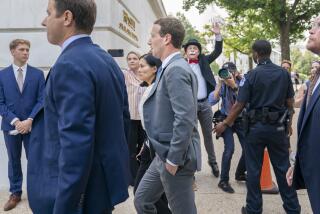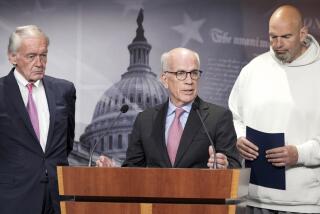Meeting on Lincoln Described : Ex-Official Says Senators’ S&L; Stance Stunned Him
- Share via
The former top regulator of the nation’s savings and loans said Monday that he was stunned when four U.S. senators summoned him to a private session 2 years ago to try to “make a deal” on behalf of Charles H. Keating Jr. and his Lincoln Savings & Loan in Irvine.
Edwin J. Gray, former chairman of the Federal Home Loan Bank Board, said the senators asked him to withdraw a proposed thrift industry restriction opposed by Keating, chairman of Lincoln’s parent company, American Continental Corp. of Phoenix.
Gray refused to withdraw the rule, which limits nontraditional thrift investments. Though the meeting between Gray and the senators had been disclosed previously, it has assumed added significance in the wake of last month’s seizure of Lincoln.
Federal regulators took control of Lincoln on April 14, a day after Lincoln’s parent firm, American Continental Corp. of Phoenix, filed for protection from creditors in U.S. Bankruptcy Court. The government said American Continental was operating the S&L; in an “unsafe and unsound” manner and was dissipating its $5.3 billion in assets.
Keating, American Continental and Lincoln are under investigation by the FBI and the Securities and Exchange Commission. A federal grand jury in Los Angeles has subpoenaed financial records of Lincoln and its parent company, according to court documents.
The senators who attended the 1987 session with Gray were Alan Cranston (D-Calif.), John Glenn (D-Ohio), Dennis DeConcini (D-Ariz.) and John McCain (R-Ariz.). Glenn denied Monday that he talked with Gray about cutting a deal for Keating. McCain said he couldn’t recall specifics of the meeting, and the other two senators couldn’t be reached for comment.
Over the past few years, the four senators have received thousands of dollars in campaign contributions from Keating, his associates, employees and members of his family. But they have defended their lobbying for Keating as a legitimate effort to represent a constituent.
“I was flabbergasted that four U.S. senators would ask a regulator to withdraw a regulation,” Gray said about his April 2, 1987, meeting with the four.
The rule, which later took effect, limits the amount of money that thrifts can invest directly in real estate projects and other nontraditional S&L; ventures. Keating has been a vocal advocate of such investments, and Lincoln has a large portion of its assets invested in real estate developments and securities.
In return for dropping of the rule, Gray said, the senators promised to “lean” on Keating to have Lincoln make more home loans, the traditional business activity of savings and loans.
“What was really bothersome was that they were trying to make a deal for their friend,” said Gray, who left his government post in June, 1987.
Gray is now president of an S&L; in Miami. Interviewed there by telephone, he claimed that the senators “not only wanted to get information, they were actually trying to bargain” for Keating and the S&L.; He said they never referred to Keating by name, only as a “friend” who ran Lincoln Savings.
Gray called the meeting a “gross violation of the integrity of the regulatory process . . . for the benefit of one person, who happened to be a friend and contributor.”
A week after the April 2 meeting, Cranston, Glenn, DeConcini, McCain and a fifth senator, Donald W. Riegle Jr. (D-Mich.), met with other regulators in an attempt to end an unusually long examination of Lincoln being conducted by the Federal Home Loan Bank of San Francisco.
Gray said the follow-up meeting was arranged because he hadn’t known enough about the status of the Lincoln examination to respond fully to the senators’ questions at the April 2 session.
Besides denying that he talked to Gray about a deal for Keating, Glenn said he couldn’t recall any discussion about the bank board rule. He said he had intervened for Keating because he was concerned about the lengthy examination of Lincoln.
Sen. Glenn’s Account
“I was vocal and I was there, but what I talked about was the unusual length of time they took to audit this company,” Glenn said. “My concerns were whether Lincoln was solvent and whether the audit was unusually long. I wanted to know if that was true.”
Assured that both were true, he said, he attended the meeting with Gray and the second session a week later to argue that the government should “charge them (Lincoln executives) or get off their backs.” When he later learned that regulators planned to refer allegations of criminal misconduct to the U.S. Justice Department, Glenn said he “bowed out” of further discussions regarding Lincoln.
Glenn said he was doing his job as a senator by helping a constituent experiencing problems with the government’s bureaucracy. American Continental is incorporated in Ohio.
McCain said he attended the meeting with Gray only “to make sure this constituent of mine received fair and equitable treatment” in the examination process.
The meeting was held in the offices of DeConcini, who led the discussion and did most of the talking, Gray said.
Gray’s comments about the meeting 2 years ago provide another indication of the unusual political clout wielded by Keating, an influential Arizona developer and financier.
Campaign contribution reports show that the senators have received a combined total of more than $300,000 in recent years in campaign contributions from Keating, his family and his employees and colleagues.
After the second meeting with regulators came to light, Riegle returned $76,000 he had received from Keating and associates. He said he gave the money back to avoid the appearance of any impropriety.
More to Read
Inside the business of entertainment
The Wide Shot brings you news, analysis and insights on everything from streaming wars to production — and what it all means for the future.
You may occasionally receive promotional content from the Los Angeles Times.










